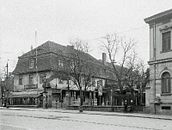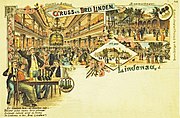Musical comedy
The Musical Comedy (colloquially MuKo ) is an operetta and musical theater in Leipzig . Your venue is located in the Lindenau district in the Dreilinden house , which is often referred to as a musical comedy itself . It is one of the three branches of the Leipzig Opera . However, it has its own ensemble with soloists, choir, ballet group and orchestra. Because of this and its own venue, it is perceived by the public as an independent cultural institution. Her repertoire ranges from the game opera to the main area of operetta to musicals.
history
Dreilinden House
For the first time in 1495, at the location of the current musical comedy, Lindenau's oldest inn was mentioned in Lindenau, which was called "Drei Linden" from the beginning of the 18th century and where Napoleon Bonaparte is said to have stayed after the Battle of the Nations . Even before 1900, the inn had a beer garden , which was a popular excursion destination for the people of Leipzig and where theater was also played in summer.
At the beginning of the 20th century, the inn was demolished and the Dreilindenstrasse / Zschochersche Strasse / Lützener Strasse arch was built with four-story residential buildings. In the courtyard area of this ensemble, the CW Naumann brewery built a hall as a magnificent concert and ballroom with 3000 seats based on a design by the architect Otto Gerstenberger . The hall had a small stage and a wine bar and a so-called beer pool on the galleries . From 1913 it was used as the “Three Linden variety”. His entrance building, also equipped with catering, was located in Dreilindenstrasse. A renovation in 1918 was aimed at further use as a metropolitan variety theater.
As all theaters in the inner city area had been destroyed or badly damaged at the end of the Second World War , the hall was used as an alternative venue for the Leipzig Opera from 1945 to 1960. In 1952, when the house was renovated, an attempt was made to meet the minimum requirements for an opera theater. With the completion of the opera house on Karl-Marx-Platz in 1960, the hall for the operetta theater became free.
Today the house has 529 places. Although reconstructions have been carried out in numerous areas since 1992, the galleries are not yet usable. Significant improvements for the artist, e.g. B. in the cloakrooms, have been carrying out ongoing construction work since 2014 including a neighboring building. In April 2018, the Leipzig city council decided on a comprehensive renovation of the musical comedy. The house is planned to be closed from July 2019 to November 2020, during which time the auditorium with orchestra pit is to be fundamentally modernized. The rear galleries are to be removed and the spectator area to be redesigned. After the renovation measure estimated at 7.6 million euros, the space should be 640. The Leipziger Westbad is to serve as an interim facility during this time , with 480 seats.
The theater
The history of Leipzig's operetta theater extends beyond that of musical comedy. In addition to the operettas in the Old Theater , the “Operettentheater am Thomasring” established in 1901/1902 in the complex of the Central Theater on Thomasring (today Dittrichring). In 1912 the theater passed into municipal ownership. In the 20s and 30s, works by Franz Lehár , Paul Abraham , Robert Stolz , Ralph Benatzky , Paul Lincke and other masters of the operetta were performed , often under the direction of the composers, and important interpreters of this genre such as Johannes Heesters performed . The theater operated until it was badly damaged in World War II.
After the war, the ensemble found temporary accommodation in a hall on Lindenauer Markt, which later became the House of Folk Art . With soloists, choir singers, dancers and orchestral musicians, it formed the core of the second municipal music theater that was built after the opera moved out of the Dreilinden house in 1960. This was called "Kleines Haus Dreilinden" and was directed by director Erhard Fischer . Classical operettas and especially the maintenance of the works of Jacques Offenbach formed the backbone of the repertoire. The contemporary work of the cheerful music theater was also cultivated with varying successes in accordance with the cultural mandate. World premieres were Rund ist die Welt by Wolfram Heicking on February 15, 1963, Urlaub ins Glück by Stefan Kerst on February 15, 1963, Mister Fogg's bet (based on Jules Verne) by Alo Koll on September 30, 1971, Olala, Mademoiselle ( based on Madame Favart by Jacques Offenbach) by Conny Odd on June 30, 1972, on June 15, 1974 Gerd Natschinski conducted the premiere of his musical Terzett , then Keep Smiling by Harry Sander and Aphrodite and the Sexual War by Gerhard Kneifel on April 30, 1976 .
In 1965 Wolfgang Weit became the new artistic director and from 1968 director of the house, which from that year called itself "Musical Comedy". Works from various musical genres, game operas, operettas and works from the 20th century, including “ Rise and Fall of the City of Mahagonny ” (staged by Joachim Herz , 1967), were performed. Now the classic Broadway musicals such as " Kiss Me, Kate ", " My Fair Lady " or " Can Can " were shown. But also newer ones like “ Sweet Charity ” were included in the program.
In 1983 Klaus Winter took over the management with a focus on the Viennese operetta and especially Johann Strauss and Robert Stolz. The Robert Stolz care was in particular the concern and merit of Roland Seiffarth , who had been musical director and chief conductor at the Musical Comedy since 1978, he also rehabilitated the operetta composer Friedrich Schröder with the performance of his opera Das Bad auf der Tenne in 1980.
After the disengagement of the Leipzig “theater company” after the fall of the Berlin Wall in 1989 and a short period of independence for the musical comedy, it became an artistically independent part of the Leipzig Opera in 1990 (as part of a multi-part theater) under the direction of Udo Zimmermann . The first director under this constellation was ballet master Monika Geppert.
Currently is the artistic director of the Leipzig Opera and consequently also of the musical comedy Ulf Schirmer . Operations director of the MuKo is Torsten Rose, music director and chief conductor is Stefan Klingele , chief director is Cusch Jung . The musical comedy ensemble consists of 14 singers, 48 musicians from the orchestra, 25 choir members and 15 dancers.
literature
- Horst Riedel: Stadtlexikon Leipzig from A to Z. PRO LEIPZIG, Leipzig 2005, ISBN 3-936508-03-8 , p. 421
- Roland H. Dippel: Repertoire Theater and Special Ensembles. Centers of cheerful music theater (series “Operetta and Musical of the GDR”, part 5) in: Leipziger Volkszeitung , March 23, 2016, No. 70, p. 12
Web links
Individual evidence
- ^ Leipzig Lexicon Dreilindenstrasse
- ^ Website of the house (go to point 1713) ( Memento of February 4, 2016 in the Internet Archive )
- ↑ Section “Functional Building” on the house's website ( Memento from February 4, 2016 in the Internet Archive )
- ↑ Peter Korfmacher: “What is possible with 7.6 million”. From July, the MuKo auditorium will be completely rebuilt and the Westbad will be used as an alternative venue . In: Leipziger Volkszeitung from January 25, 2019, p. 9.
- ↑ Leipzig Latest News , October 5, 1937
Coordinates: 51 ° 20 ′ 10.2 ″ N , 12 ° 20 ′ 21 ″ E





